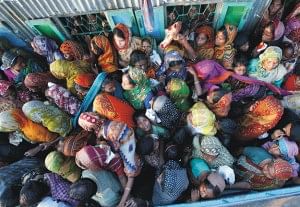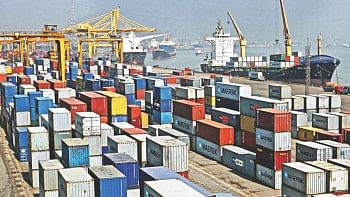Sidr and beyond

Photo: AFP
SIDR, a tropical revolving storm (TRS), commonly known as cyclone in this part of the world, that hit the country on the night of November 15 with a wind speed of more than 230 kph will probably be remembered for quite some time as one of the fiercest cyclones the country has ever faced.
Although, in terms of loss of human lives, Sidr, with10,000 to 15,000 dead according to unofficial estimates, may not be considered as deadly as the cyclones of 1970 (500,000 dead) or of 1991 (138,000 dead) in terms of loss to the national economy, it might appear to be the worst of its kind. The hurricane scale wind, with 15 to 20 feet high tidal wave that swept across the coastal districts and ripped through the heart of the country from south-west to north-east, affected almost one third of the country's population, nearly six million people, directly.
The loss and suffering to the people of the south-western coastal districts have been colossal to say the least. Dwelling houses have been blown off, trees razed to the ground, standing crops demolished, roads, bridges and culverts destroyed, and livestock washed off. More than 4000 educational institutes have been fully or partially damaged. Almost one-third of the Sunderbans, a world heritage, has been totally demolished.
A large number of people of the coastal belt, for obvious reasons, earn their livelihood by engaging in fishing or fish related business. Sidr has literarily made them paupers. The fishermen have lost their boats and nets, the shrimp cultivators their stock of shrimp, and the fish traders their business.
Estimates of loss to the national economy, as usual, vary widely in range. Some estimates suggest Tk 5,000-10,000 crore, others Tk. 20,000 crore or more. What is most alarming is the loss of the standing crop. Almost half of the aman crop, the only crop for a year in this part of the country, which was about to be harvested, has been totally lost.
As a result, the country's annual food deficit, already running between 20-25 lac tons over the years, is likely to shoot up to 40-45 lac tons this year due to two consecutive floods in the recent months and now the devastating cyclone, necessitating procurement of at least 10 lac tons of food grains on emergency basis from outside sources in the next 3-4 months.
The country's economy is certainly passing through the most critical and challenging period since independence, as stated by the country director of Asian Development Bank, Ms. Hua du, while disclosing the quarterly ADB Report 2007 on Bangladesh in a press conference in the city last week.
Extensive damage by natural calamities, high fuel price, fall in external demand for garments, political chaos and instability, and a massive anti-corruption drive in the back drop of all engulfing corruption spread in every strata of the society, have made the economy critically vulnerable.
No wonder, Ms Hua Du said in the conference: "I have been here for 5 and a half years, and have studied about Bangladesh for several decades since independence, but I have never sensed such difficulties as the country is going to face this year (Daily Star November 27)."
It is heartening to see the spontaneous response of the world community at large, the donor countries and the donor agencies in particular, to help us in this particular period of national crisis. They have come forward with every kind of assistance -- in both cash and kind -- in the relief and rehabilitation program for the cyclone affected people. We are grateful to them.
I am confident that, given the resilience the people of this country have and the response we are receiving from the people at home and abroad, we will overcome the crisis as we did on so many occasions in the past.
It may not be, however, out of context for Bangladesh, as a country among the ones to be worst affected by climate change, to draw the attention of our development partners to the latest Human Development Report released in the city on November 27, and request them to go beyond what they are doing in mitigating the sufferings of the people struck by natural calamities, which are not necessarily all natural.
The report says: "Those who largely caused the problem -- the rich countries -- are not going to be those who suffer most in the short term. It is the poorest, who did not, and are not contributing to green house emission who are the most vulnerable."
It is now getting clearer every day that the natural calamities like flood, cyclone and tidal bore, that Bangladesh is frequently attacked with are not all natural. They have a definite relation with the much talked about global warming caused by greenhouse emission of the industrialised and developed countries.
The warning that almost a third of Bangladesh will go under the sea in the next quarter of a century, if the global warming and the climate change continues as it is, can no longer be taken lightly. It is high time the matter is taken up in the international forum with the loudest possible voice.
Capt. Husain Imam is a freelance contributor to The Daily Star.

 For all latest news, follow The Daily Star's Google News channel.
For all latest news, follow The Daily Star's Google News channel. 



Comments